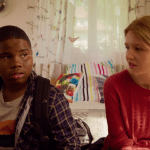The summer of 2016 hasn’t been a great one at the movies, but just when the season should be ending with its customary August whimper of castoff titles aiming for one- or two-weekend cash grabs, it’s showing signs of life. Not only is adult fare like Hell and High Water getting raves from critics, but Disney’s live-action Pete’s Dragon has given families something they can enjoy together.
To be fair, kids have had their share of summer movies this year. Finding Dory and The Secret Life of Pets don’t amount to an overwhelming number of well-received kid-friendly titles, but they’ve nevertheless been gigantic hits and have been favorably received by critics.
In the case of the new animated release Kubo and the Two Strings, the studio behind it, Laika, has made a name for itself with the offbeat, stop-motion animation films Coraline, The Boxtrolls and ParaNorman. All found an appreciative audience, if nowhere near the size of Pixar’s Dory or Universal’s Pets, perhaps because the darker stories and subject matter haven’t always been tailor-made for mass appeal.
It’s hard to see that changing with Kubo and the Two Strings, which is set in a mythic Japan and steeped in Eastern religious rituals. But for audiences that don’t demand Western-specific stories that dovetail with the great monotheistic faiths, Kubo is an often thrilling, captivating piece of work. It doesn’t condescend to its youngest audience members or to anyone expecting an easily digestible, easy-to-forget two hours at the multiplex. Instead, Kubo is a sometimes complex, intense tale of migrating spirits and inanimate creatures coming to life—and of a mother’s love for her child. The worldview, far from Christian, will challenge viewers who need works of popular culture to affirm their most cherished beliefs, but taken on its own terms, Kubo succeeds as a work of imaginative storytelling and masterful animation.
In a seaside town, Kubo takes care of his mother and, with the help of some magical origami figures, tells stories to the locals. He may have only one eye, but his imagination, powered by the stories his mother has told him about a moon king, is vivid enough to captivate his hearers. As Kubo’s mom explains to him, Kubo’s time with her is the product of a struggle between her and his grandfather—a fight that led to Kubo losing an eye.
Kubo must stay inside at night lest he be spotted by his grandfather or by a pair of creepy sisters who want to take Kubo’s remaining eye. When Kubo unleashes forces beyond his control, he must flee his village, taking along a monkey charm that comes to life and a warrior Beetle, who swears to predict Kubo. The monkey directs Kubo to search for a helmet, armor and a sword to protect against his vengeful family members.
The danger to the young boy is palpable at times in Kubo and the Two Strings, which intersperses scenes of Kubo’s delightful storytelling with the menacing figures who want to steal him away from his mother. That existence includes religious rituals, prayers for spirits to offer light to the living, and “magic” that allows human souls to inhabit inanimate objects. It’s obviously not Bible 101 and shouldn’t be engaged at that level. Rather, it’s more akin to Bernardo Bertolucci’s Little Buddha or the animated films of Studio Ghibli—an introduction to certain Eastern religious beliefs and traditions, wrapped in visual splendor.
The vocal work by Art Parkinson in the role of the 12-year-old Kubo captures the sense of wonder and danger the boy experiences, while Charlize Theron’s droll voicing of Monkey is frequently humorous. Even better is Matthew McConaughey’s Beetle, whose comic relief calls to mind Tim Allen’s work in Pixar’s Toy Story films.
As strong as the vocal work is, the film’s most impressive element is its stop-motion animation. That’s especially apparent when the intensity meter hits the red zone, as it does during Kubo’s separation from his mother and in a final confrontation with a snake-like moon king. Those episodes are sure to terrify children who haven’t already been unsettled by the eerie, other-worldly episodes that precede the story’s climactic showdown, so parents should be selective in deciding if their children would enjoy Kubo and the Two Strings.
The film’s appeal may not be as broad as that of Finding Dory and The Secret Life of Pets. But although its box-office prospects likely will be dwarfed by those two summer-movie titans, Kubo is surely their equal, or better, as a work of art. This is a story that’s likely to endure through the sheer force of its originality. Its excellence speaks for itself.













